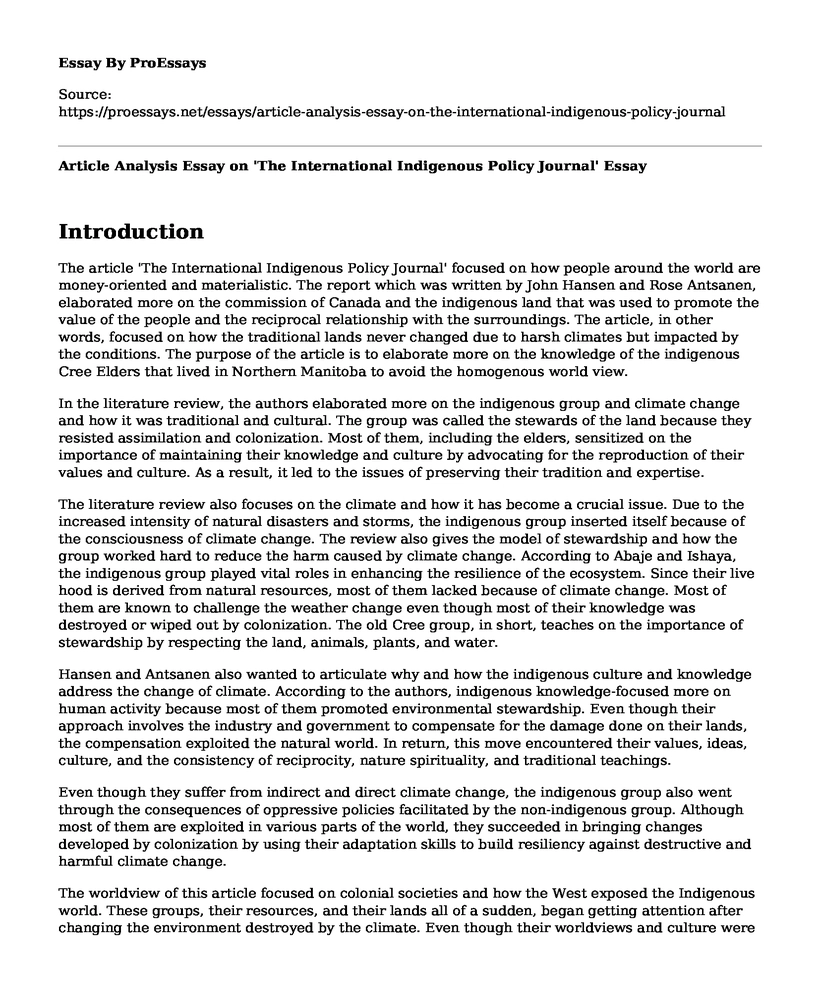Introduction
The article 'The International Indigenous Policy Journal' focused on how people around the world are money-oriented and materialistic. The report which was written by John Hansen and Rose Antsanen, elaborated more on the commission of Canada and the indigenous land that was used to promote the value of the people and the reciprocal relationship with the surroundings. The article, in other words, focused on how the traditional lands never changed due to harsh climates but impacted by the conditions. The purpose of the article is to elaborate more on the knowledge of the indigenous Cree Elders that lived in Northern Manitoba to avoid the homogenous world view.
In the literature review, the authors elaborated more on the indigenous group and climate change and how it was traditional and cultural. The group was called the stewards of the land because they resisted assimilation and colonization. Most of them, including the elders, sensitized on the importance of maintaining their knowledge and culture by advocating for the reproduction of their values and culture. As a result, it led to the issues of preserving their tradition and expertise.
The literature review also focuses on the climate and how it has become a crucial issue. Due to the increased intensity of natural disasters and storms, the indigenous group inserted itself because of the consciousness of climate change. The review also gives the model of stewardship and how the group worked hard to reduce the harm caused by climate change. According to Abaje and Ishaya, the indigenous group played vital roles in enhancing the resilience of the ecosystem. Since their live hood is derived from natural resources, most of them lacked because of climate change. Most of them are known to challenge the weather change even though most of their knowledge was destroyed or wiped out by colonization. The old Cree group, in short, teaches on the importance of stewardship by respecting the land, animals, plants, and water.
Hansen and Antsanen also wanted to articulate why and how the indigenous culture and knowledge address the change of climate. According to the authors, indigenous knowledge-focused more on human activity because most of them promoted environmental stewardship. Even though their approach involves the industry and government to compensate for the damage done on their lands, the compensation exploited the natural world. In return, this move encountered their values, ideas, culture, and the consistency of reciprocity, nature spirituality, and traditional teachings.
Even though they suffer from indirect and direct climate change, the indigenous group also went through the consequences of oppressive policies facilitated by the non-indigenous group. Although most of them are exploited in various parts of the world, they succeeded in bringing changes developed by colonization by using their adaptation skills to build resiliency against destructive and harmful climate change.
The worldview of this article focused on colonial societies and how the West exposed the Indigenous world. These groups, their resources, and their lands all of a sudden, began getting attention after changing the environment destroyed by the climate. Even though their worldviews and culture were oppressed, they used other ways to interpret the world. The authors wanted to teach that traditional worldviews never see the tribal nations or governments or the inner beings or force of the universe but people that share the world with countries and powers on non-human and human beings. The indigenous people, in other words, portray a specific knowledge that embodies a crucial understanding of the cultures, identities and worldviews.
Conclusion
The article 'The International Indigenous Policy Journal' focused on how people around the world are money-oriented and materialistic. In the literature review, the authors elaborated more on the indigenous group and climate change and how it was traditional and cultural. The report also gives the model of stewardship and how the group worked hard to reduce the harm caused by climate change. The authors wanted to teach that traditional worldviews never see the tribal nations or governments or the inner beings or force of the universe but people that share the world with countries and powers on non-human and human beings. The authors also wanted to teach that traditional worldviews never see the tribal nations or governments or the inner beings or force of the universe but people that share the world with countries and powers on non-human and human beings.
The article has been presented clearly because the authors talked about the elders and how the search for the indigenous world was necessary because of the older people that visited to listen to their language. The elders were selected because of the development between the older people and the researchers. For many years this group of people has been known to teach the valuable lessons of life to express their deep happiness in teaching knowledge to people. In response to this article, it is clear that natural laws use the same road on the same cycle or circle. When something is put outside, it will have to come back. When positivity is embraced, then that is what will be received.
Bibliography
Hansen, John G, and Rose Antsanen. "What Can Traditional Indigenous Knowledge Teach Us About Changing Our Approach to Human Activity and Environmental Stewardship to Reduce the Severity of Climate Change?" International Indigenous Policy Journal 9, no. 3 (2018): 1-15. https://doi.org/10.18584/iipj.2018.9.3.6.
Cite this page
Article Analysis Essay on 'The International Indigenous Policy Journal'. (2023, Mar 28). Retrieved from https://proessays.net/essays/article-analysis-essay-on-the-international-indigenous-policy-journal
If you are the original author of this essay and no longer wish to have it published on the ProEssays website, please click below to request its removal:
- Electronic Waste (E-Waste): Time to Reduce, Reuse, and Recycle
- Articles Analysis Essay on Pollution in South Asia
- Essay on the Limits of Political Blindness: Re-examining Democracy's Pillars
- Essay on Government's Data Collection From Non-Criminals: Processes & Benefits
- Essay Example on El Chapo Trial: Mexico's Drug War Spectacle
- Ratification of US Constitution: A Historical Debate - Essay Sample
- Report Example on Volcanic Massive Sulphide







